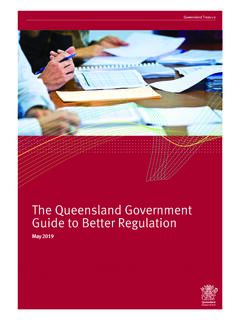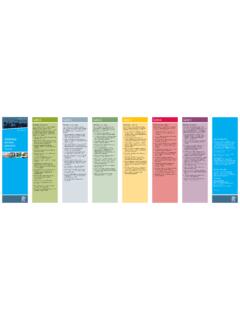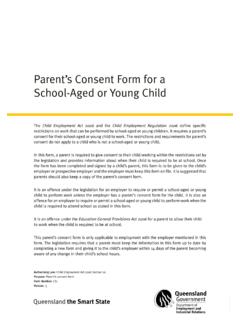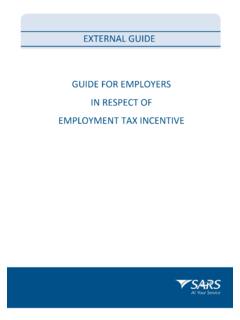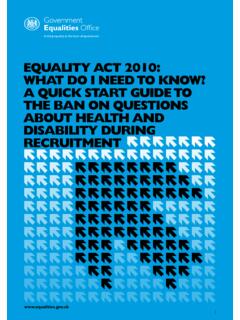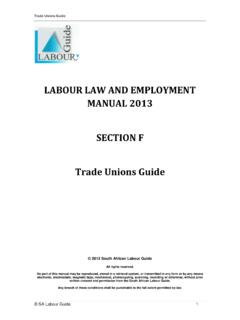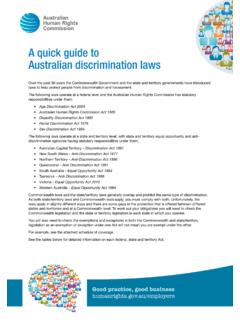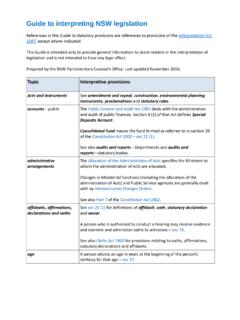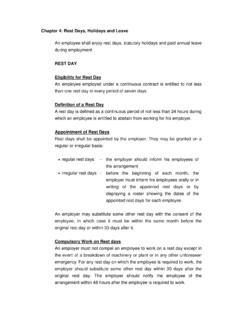Transcription of Child Employment Guide - Queensland Treasury
1 IChild Employment GuideChild Employment GuideDepartment of Justice and Attorney-GeneraliiiChld Employment Guhde The State of Queensland (Department of Justice and Attorney-General) November protects this publication. The State of Queensland has no objection to this material being reproduced but asserts its right to be recognised as author of its original material and the right to have its material remain Employment (other than the entertainment industry)..3 What you need to know .. on school-aged or young children working ..5 Authority to work ..6 Parent s consent form ..7 Special circumstances certificate ..7 Chief Executive may prohibit or limit the work a Child may do ..8 Requirements for all children under 18 years of age ..8 Enforcement ..10 Proceedings for offences ..10 Appeals .. (for work in the entertainment industry)..11 What you need to know.
2 On school-aged or young children working ..13 Authority to work ..16 Parent s consent form ..16 Special circumstances certificate ..17 Chief Executive may prohibit or limit the work a Child may do ..18 Employer duties for school-aged, young children and babies ..18 Requirements for all children under 18 years of age ..21 Enforcement ..23 Proceedings for offences ..23 Appeals .. Employment GuhdePurposeThe purpose of the Child Employment Act 2006 and the Child Employment Regulation 2006 is to protect all children working in Queensland . These laws aim to protect children from being required to perform work that may be harmful to their health and safety, or physical, mental, moral and social laws are also designed to ensure that work does not interfere with a Child s education, particularly for the period when the Child is required to be at school.
3 Therefore the bulk of the Act relates to school-aged children. In recognition of the unique requirements of work in the entertainment industry, this industry is exempt from some of the general provisions that apply to children working in other industries. Instead, conditions specific to the entertainment industry form part of the Child Employment Guide is divided into two sections, the first deals with the general Child Employment conditions that apply across industries and the second contains information on the Employment of children in the entertainment Act is effective as of 1 July covering the entertainment industry take effect as of 1 January Employment GuideChild Employment Guide (other than the entertainment industry)What you need to knowIn Queensland , the Employment of children (those under 18 years of age) is governed by the Child Employment Act 2006 and the Child Employment Regulation 2006.
4 The legislation protects children from being required to perform work that may be harmful to their health and safety, or that compromises their mental, moral or social welfare. The Act and Regulation also limits the hours of work of school-aged children to ensure that their studies aren t adversely school-aged Child is a Child who is under 16 years and required to be enrolled at a school. A Child who is below the age of 16 years is not a school-aged Child if the Child has completed compulsory schooling ( completion of year 10) or is for any other reason not required to be enrolled at a school. For example, a Child is not a school-aged Child if they: are 16 years of age or older but have not completed year 10 of their schooling, or have completed year 10 of their schooling (or are for any other reason not required to be enrolled at a school) but are under 16 years of age.
5 The new laws set the age at which children can work at 13, although those between 11 and 13 can perform supervised delivery work for items such as newspapers and advertising restrictions introduced by the Act include preventing school-aged children from being required to work longer than: 12 hours during a school week 38 hours during a week that is not a school week four hours on a school day eight hours on a day that is not a school day. School-aged children are not allowed to work between 10pm and 6am. Children between 11 and 13 years of age who are performing supervised delivery work are not allowed to work between 6pm and 6am. Parents are also required to play their part. The Act makes it illegal to employ a school-aged Child until an employer has obtained a parent s consent form. The form must be signed by the Child s parent and include information for the employer about the hours when the Child is required to be at school.
6 A new form must be completed when those hours change. The employer must keep the signed consent form on Act and the Regulation outline offences and penalties for employers who do not comply with the law. These laws also prohibit the Employment of children while nude or partially of the Child Employment laws will be carried out by inspectors who will monitor compliance and investigate and deal with alleged contraventions. 4iChld Employment GuhdeDefinitionsSchool-aged childA school-aged Child is a Child who is under 16 years and required to be enrolled at a school. A Child who is below the age of 16 years is not a school-aged Child if the Child has completed compulsory schooling ( completion of year 10) or is for any other reason not required to be enrolled at a school. More information on when a Child is required to be enrolled at a school is available in the Education (General Provisions) Act childA young Child is a Child who is not old enough to be enrolled for compulsory schooling.
7 While it is not envisaged that there will be many instances where young children will work, there are occasions where this could happen, young children working in the entertainment The term work has a broad application including work that is carried out for labour only or substantially for labour only and work performed under piecework rate arrangements as well as under a traditional Employment arrangement. Work does not include genuine independent subcontracting arrangements. Participating or assisting in a business carried on for profit is included under this definition, even where the Child does not receive payment or other reward. This definition also includes work performed as a supervisor. Work does not include domestic chores. Domestic chores have been deliberately excluded from the definition of work in recognition of the differences between true work and activities performed as a chore or a family obligation.
8 Work carried out as part of work experience, vocational placements, apprenticeships, traineeships and charitable collections covered by other legislation are not subject to the requirements of this parent is the Child s mother, father or another person who exercises parental control over the Child . However, a person temporarily acting in the place of the parent is not considered to be a the Child is an Aboriginal or Torres Strait Islander, a parent includes a person who is regarded as such under Aboriginal or Torres Strait Islander a person has been granted guardianship under the Child Protection Act 1999, or where a person has been granted parental responsibility through a decision of a Federal or State court then that person is considered to be the only parent of the Child . In these cases, no other person, including the Child s biological parent, would be regarded as the Child s parent under this Act.
9 Family businessA family business is a business wholly owned by a close adult relative of the Child . Family businesses are exempt from the minimum age, maximum hours, prohibited hours and break requirements imposed under the Act. Other requirements such as work prohibited under a regulation and employer obligations with respect to safeguarding children while at work, contact with parents and record keeping requirements apply to children working in a family consent requirements apply to family businesses except where the employer is the parent. 5 Child Employment GuideRestrictions on school-aged or young children workingThe following work restrictions apply only to the work of school-aged and young children. Age restrictionsThe Act prohibits the Employment of children below the ages specified in the Regulation. Generally the minimum age for Employment is 13 years.
10 This is lowered to 11 years where the Child carries out supervised delivery work that involves delivering newspapers, advertising material or similar items between the hours of 6am and 6pm. Maximum hours of workSchool-aged childrenThe Act restricts Employment of school-aged children outside of the hours stipulated by the Regulation. The Regulation differentiates between the hours that a school-aged Child can work on a day when they are required to attend school and a day when they are not required to attend a school day a school-aged Child can work a maximum of four hours. On a day when a school-aged Child is not required to attend school they can work a maximum of eight distinction is also made between the maximum hours a school-aged Child can work during a school week and a non-school week. A school week is a week, commencing on a Sunday, when the Child is required to attend school on any day of that week.
